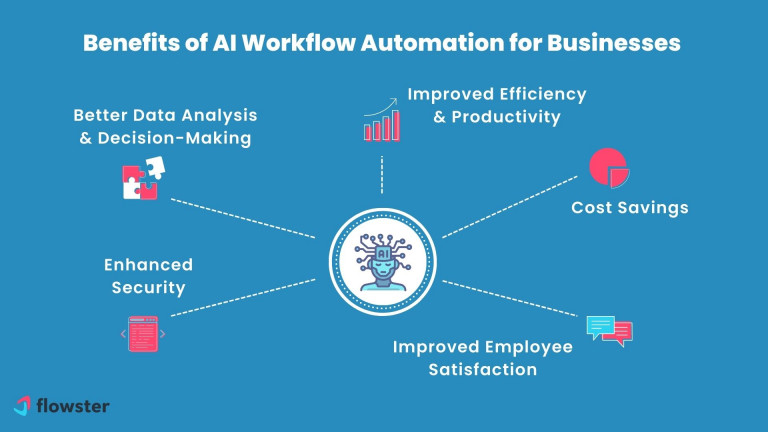
How Business Intelligence Software Enhances Workflow Automation
In today’s fast-paced business landscape, organizations are constantly seeking ways to improve efficiency, reduce costs, and enhance decision-making. One key strategy that has gained significant attention in recent years is workflow automation, which involves using technology to automate and streamline business processes. Business intelligence (BI) software has emerged as a critical tool in enhancing workflow automation, enabling companies to make data-driven decisions, optimize operations, and drive growth. In this article, we will explore how business intelligence software enhances workflow automation and its benefits for organizations.
What is Business Intelligence Software?
Business intelligence software is a set of tools and technologies that enable organizations to collect, analyze, and interpret large amounts of data to gain insights and make informed decisions. BI software provides a comprehensive platform for data analysis, reporting, and visualization, allowing companies to monitor performance, identify trends, and predict future outcomes. By leveraging BI software, organizations can transform raw data into actionable intelligence, driving business growth and competitiveness.
What is Workflow Automation?
Workflow automation refers to the use of technology to automate and streamline business processes, reducing manual labor, and minimizing errors. Workflow automation involves the use of software tools to manage and execute tasks, such as data entry, document processing, and communication. By automating workflows, organizations can improve productivity, reduce costs, and enhance customer satisfaction.
How Business Intelligence Software Enhances Workflow Automation
Business intelligence software enhances workflow automation in several ways:
- Data-Driven Decision Making: BI software provides organizations with real-time data and analytics, enabling them to make informed decisions about workflow automation. By analyzing data on process performance, companies can identify areas for improvement and optimize workflows accordingly.
- Process Monitoring and Optimization: BI software enables organizations to monitor workflows in real-time, identifying bottlenecks, and areas for improvement. This enables companies to optimize workflows, reduce cycle times, and enhance productivity.
- Automated Reporting and Analytics: BI software automates reporting and analytics, providing organizations with timely and accurate insights into workflow performance. This enables companies to track key performance indicators (KPIs) and make data-driven decisions.
- Predictive Analytics: BI software provides predictive analytics capabilities, enabling organizations to forecast future workflow demand and optimize resources accordingly. This helps companies to reduce waste, improve capacity planning, and enhance customer satisfaction.
- Integration with Workflow Automation Tools: BI software can be integrated with workflow automation tools, such as robotic process automation (RPA) and business process management (BPM) systems. This enables organizations to automate workflows, monitor performance, and make data-driven decisions.
Benefits of Business Intelligence Software in Workflow Automation
The integration of business intelligence software with workflow automation offers several benefits to organizations, including:
- Improved Efficiency: BI software enhances workflow automation by providing real-time data and analytics, enabling organizations to optimize workflows and reduce manual labor.
- Enhanced Decision Making: BI software provides organizations with timely and accurate insights into workflow performance, enabling them to make data-driven decisions and drive business growth.
- Increased Productivity: By automating workflows and providing real-time data and analytics, BI software enables organizations to improve productivity, reduce cycle times, and enhance customer satisfaction.
- Reduced Costs: BI software helps organizations to identify areas for cost reduction, such as minimizing waste, reducing energy consumption, and optimizing resource allocation.
- Competitive Advantage: By leveraging BI software and workflow automation, organizations can gain a competitive advantage in the market, driving business growth and innovation.
Real-World Examples of Business Intelligence Software in Workflow Automation
Several organizations have successfully leveraged business intelligence software to enhance workflow automation, including:
- Manufacturing: A leading manufacturer used BI software to automate its supply chain management workflow, reducing inventory costs by 25% and improving delivery times by 30%.
- Healthcare: A healthcare provider used BI software to automate its clinical workflow, reducing patient wait times by 40% and improving patient satisfaction by 25%.
- Finance: A financial services company used BI software to automate its trading workflow, reducing trading errors by 90% and improving trade execution times by 50%.
Conclusion
Business intelligence software has emerged as a critical tool in enhancing workflow automation, enabling organizations to make data-driven decisions, optimize operations, and drive growth. By leveraging BI software, companies can transform raw data into actionable intelligence, driving business innovation and competitiveness. As organizations continue to seek ways to improve efficiency, reduce costs, and enhance decision-making, the integration of business intelligence software with workflow automation will become increasingly important. Whether in manufacturing, healthcare, finance, or other industries, BI software has the potential to revolutionize workflow automation, enabling organizations to achieve their goals and thrive in a rapidly changing business landscape.
Future Outlook
As business intelligence software continues to evolve, we can expect to see even more advanced capabilities, such as artificial intelligence (AI) and machine learning (ML) integration, enabling organizations to make even more informed decisions and drive greater business value. Additionally, the increasing adoption of cloud-based BI software will provide organizations with greater flexibility, scalability, and accessibility, enabling them to leverage BI software anywhere, anytime.
In conclusion, business intelligence software has emerged as a critical tool in enhancing workflow automation, enabling organizations to make data-driven decisions, optimize operations, and drive growth. By leveraging BI software, companies can transform raw data into actionable intelligence, driving business innovation and competitiveness. As organizations continue to seek ways to improve efficiency, reduce costs, and enhance decision-making, the integration of business intelligence software with workflow automation will become increasingly important, driving business success and growth in the years to come.
Closure
Thus, we hope this article has provided valuable insights into How Business Intelligence Software Enhances Workflow Automation. We appreciate your attention to our article. See you in our next article!


